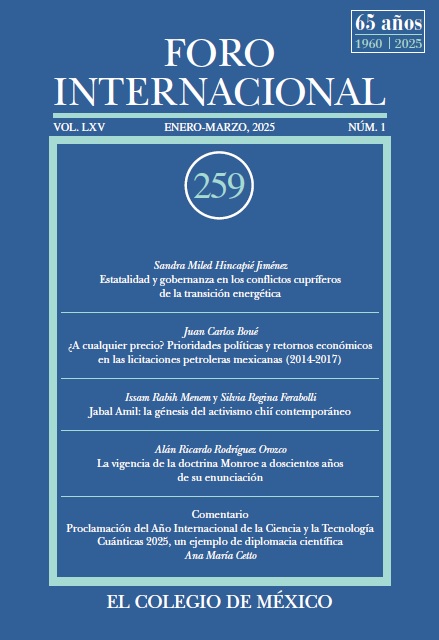Proclamation of the International Year of Quantum Science and Technology 2025, an Example of Science Diplomacy
DOI:
https://doi.org/10.24201/fi.3131Keywords:
scientific negotiations, diplomatic negotiations, quantum physics, quantum technologies, UNESCO, science diplomacyAbstract
On June 7, 2024, the United Nations General Assembly proclaimed the year 2025 as the International Year of Quantum Science and Technology (IYQ2025), as a result of long scientific and diplomatic negotiations that began in October 2021, at the initiative of the International Union of Pure and Applied Physics. This article gives an account of the origins, preparations and significance of the IYQ2025 declaration and offers a reflection on the diplomatic negotiations undertaken.
The celebration of the centenary of the first breakthroughs in modern quantum mechanics provides a valuable opportunity to raise awareness of the importance of quantum science and technology in our lives and its transformative impact on society. Hence the need for each country to develop its own capabilities in this field, both scientific, technological and productive, in order to contribute to scientific progress and, at the same time, to take advantage of its benefits for society and national development.
Downloads
References
Año Internacional de la Ciencia y Tecnología Cuántica. 2024. Una celebración mundial. Participantes. https://quantum2025.org/es/partners/
International Union of Pure and Applied Physics (iupap). 2021. Resolutions of the 30th General Assembly of the iupap (Resolutions 9). Ginebra: Suiza, 20-22 de octubre de 2021. https://urlz.fr/qL7W
Naciones Unidas 2024a. Asamblea General de las Naciones Unidas. Septuagésimo octavo período de sesiones. Finlandia, Ghana, India, Perú, Sudáfrica y Turkmenistán*: proyecto de resolución. Proyecto de resolución A/78/L.70 (10 de mayo de 2024). “Año Internacional de la Ciencia y la Tecnología Cuánticas (2025)”. https://documents.un.org/doc/undoc/ltd/n24/131/83/pdf/n2413183.pdf
Naciones Unidas 2024b. Objetivos de Desarrollo Sostenible. https://www.un.org/sustainabledevelopment/es/
Ordóñez-Matamoros, G., M. P. Roa González y J. P. Centeno. 2021. “Reflexiones en torno a la diplomacia científica: Estado del debate, experiencia internacional y perspectivas para Colombia”. Revista Oasis, 34: 13-38. https://urlr.me/vHk1M DOI: https://doi.org/10.18601/16577558.n34.03
Turekian, V. 2018. “The Evolution of Science Diplomacy”. Global Policy, 9 (S3): 5-7. https://doi.org/10.1111/1758-5899.12622 DOI: https://doi.org/10.1111/1758-5899.12622
United Nations Educational, Scientific and Cultural Organization (unesco). 2016. The International Year of Light and Light-based Technologies 2015: A Successful Community Partnership for Global Outreach: Final Report. https://urlz.fr/mKpt
United Nations Educational, Scientific and Cultural Organization (unesco). 2023a. “Propuesta de proclamación por las Naciones Unidas de 2025 como Año Internacional de la Ciencia y la Tecnología Cuánticas”. Documento 216 EX/37 de la 216ª reunión del Consejo Ejecutivo de la unesco. París: 14 de abril de 2023. https://urlz.fr/qJSB
United Nations Educational, Scientific and Cultural Organization (unesco). 2023b. Organización de las Naciones Unidas para la Educación, la Ciencia y la Cultura. Actas de la Conferencia General, 42ª reunión, París, 7-22 de noviembre de 2023, vol. 1, Resoluciones, resolución 23. https://urlr.me/nwV6L
United Nations Educational, Scientific and Cultural Organization (unesco). 2024. Organización de las Naciones Unidas para la Educación, la Ciencia y la Cultura. About IYBSSD. https://urlr.me/YZD41













